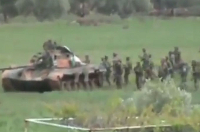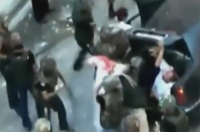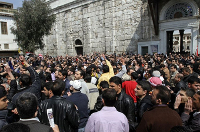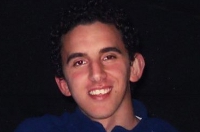Muhammad Radwan
Egyptian-American engineer beaten, threatened with death and forced to invent a story about spying for Israel.
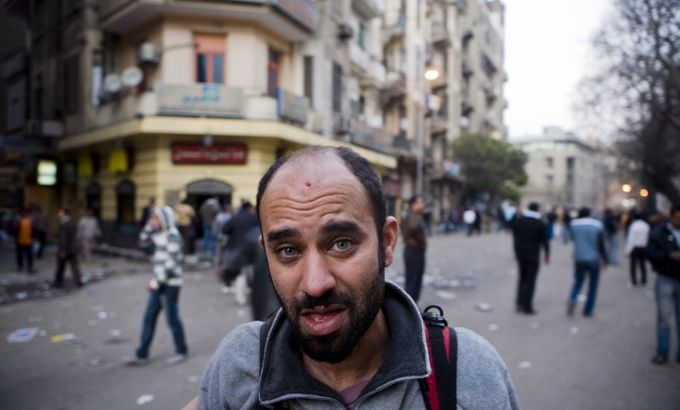
On Muhammad Radwan’s sixth night in custody somewhere in Damascus, his guards led him out of his cell, blindfolded and handcuffed, took him out of the jail and into another building a few metres away, then up two flights of stairs. The short walk and ascent were painful: Radwan had been beaten the day he was arrested, and the effects still lingered.
(Skip to the stories of others imprisoned in Syria.)
The majority of his punishment had been a torture known as falaka in some Arabic-speaking countries and felga in others – a thorough beating, often with a flexible baton, on the sensitive soles of the feet. It had left Radwan’s too swollen to fit into his shoes.
The guards led Radwan into a room and told him to wait. As he stood, he saw the floor visible beneath the edge of his blindfold. It was parquet, not the concrete and tile of the detention centre. He smelled leather furniture and cologne on the air. He heard the voice of a familiar interrogator, Tarek.
In his head, Radwan thought of Tarek by a different name: Fidny wa Afeedak. It was an Arabic version of “you scratch my back, I’ll scratch yours”.
Fidny was a middle-aged man who wore nice sweaters over collared dress shirts. His hair was in a combover. He looked like a well-to-do businessman.
“‘Benefit me and I’ll benefit you,'” he would tell Radwan.
“He’d tell me this, so that became his name. ‘Tell me what I want to know’.”
Another man, likely a higher-ranking officer, entered the room.
“I’ve been going through your story, and it doesn’t make sense unless you’re CIA or Mossad. Are you?”
Radwan said no.
“Are you sure? Are you positive?”
Again Radwan said no.
The man walked away to make a phone call. Fidny stepped close and whispered.
“Man, if you don’t tell him right now that you’re CIA or Mossad, they’re gonna kill you today or tomorrow.”
‘They have so much at stake’
Radwan had been arrested while watching a demonstration at the capital’s Umayyad Mosque, ten days after the first protests began in Damascus.
A college-educated engineer who holds citizenship in Egypt and the United States, he had travelled abroad after graduating and had been in Cairo during the revolution. He was a regular in Tahrir Square, where his cousin had set up a tent. Shortly before the protests began in Syria, he had returned to Damascus, where he managed a branch office for a petroleum services company. His father sits on the board.
A few days earlier, the company’s chairman, who had been trapped in Tripoli during the beginning of the Libyan uprising, had warned Radwan in an email: “Don’t make my mistake.”
Radwan had gone to the mosque get a better sense of the protests.
 |
| Radwan with a pellet-gun injury to his forehead, received during protests in Cairo [Hossam el-Hamalawy] |
Inside the mosque, the imam had been denouncing foreign interference in Syria when a group in the back of the prayer hall began chanting anti-government slogans. Radwan tapped out a tweet on his new Android phone. Two men approached from behind, grabbed him by the arms and pulled him into a side room.
Twenty minutes later, he and seven other men were rushed into a van and taken to a detention facility, their hands tied and mouths taped.
After his beating on the day of his arrest, Radwan’s interrogators prompted him to invent a story that would make him out to be a spy: He had travelled to Israel, met a source and conspired to sell photos and videos of the Syrian uprising. After his captors hashed out the tale, they filmed his staged confession. It was aired on television later that night.
“I settled on the fact that they were gonna kill me,” Radwan said. “But it’s OK. You reach this certain level of peace, because you know you weren’t a bad person, you know you did a lot more than anyone else got to do in a lifetime, and you were always talking about positivity.”
It was obvious none of his interrogators believed he was spying, Radwan said. But the officers in charge of his interrogation were clearly sensitive to the unrest spreading through the Arab world, and they knew that information about protests in Syria was getting out.
“I think all of them were quite aware, and are quite aware of what the Syrian regime does,” Radwan said. “But they have so much at stake that they don’t care, all they want to do is paint these people out.”
An imagined conspiracy
The pressure must have been heavy from higher-ranking officers to make Radwan into a prize catch, a spy to prove the regime’s theories of foreign interference, he imagined.
Fidny wa Afeedak was certainly eager to concoct the Israel story as fast as possible, in an interrogation session that wavered between comedic fantasy and terror.
He and Radwan were alone after Radwan’s beating. Radwan, assuming they would gain access to his email account, admitted that he had received a message from a Colombian journalist a few days earlier, asking for information about the protests in Syria.
Fidny explained that Radwan had to help him. You’ve been to Jordan, he said. You went to Israel and you met the Colombian, who was actually a Mossad agent.
Radwan shook his head, and Fidny called in a guard. The man pulled Radwan to the ground, and Fidny leaned down to show him, beneath his blindfold, a wire that had been stripped and pulled into two prongs. He would be soaked in water and electrocuted if he didn’t explain his trip to Israel, Fidny said. The trip, of course, had not occurred.
“So how did you get there,” Fidny asked, after Radwan had been seated again.
“By taxi,” Radwan said.
“Which crossing did you use?”
“I don’t know.”
A guard standing in the back of the room spoke: “Philadelphi?”
“Yes, that’s it, Philadelphi.”
Radwan said he went to Bethlehem, but couldn’t meet his contact. The man’s phone had been turned off.
What did you do then, Fidny asked. Radwan said he returned to Jordan.
“No you didn’t!” Fidny shouted, furious. “You went to Jerusalem!”
Radwan admitted it was true.
“I was always trying to give up as little detail as possible,” Radwan explained. “I would stop at every major juncture and say, ‘That’s it,’ and they’d keep asking for more. They know I’m lying, I know I’m lying, I’m trying to limit as much as possible, and they’re trying to get as much as they can.”
Radwan embellished the story. He said he stayed in East Jerusalem but got lost walking around the city. He ran into a group of Jews with long sidelocks and kippas. They stared because he looked like an Arab, so he left.
“See,” Fidny said, enjoying the detail. “See what happens and how they are?”
Radwan thought to himself: These guys know I’m lying. They just asked me to lie. They just threatened me.
“So when he’s like, ‘See how Jews treat Arabs,’ you’re in a complete state of shock,” Radwan recounted. “How is this guy talking to me like this? You’re just completely dumbfounded … you’re losing your rational mind here.”
Fidny told Radwan he met the Colombian, who taught him how to “use technology”. Radwan said no.
Fidny insisted. Radwan admitted he had been taught how to use an iPhone.
“Bravo,” Fidny said.
Radwan returned to his cell, wondering if he had just been through a dream, or a nightmare.
Into the grinder
Radwan’s spirit broke on his third day in custody, two days after his beating and confession.
He was taken to a room and made to stand in front of a laptop while guards and officers watched. His captors had found a video of Radwan, and they were not happy.
They gave him headphones to wear, then pressed play. It was a report by a Voice of America journalist who had arrived late in the Egyptian revolution, after President Hosni Mubarak’s resignation. Radwan had been introduced through a friend and agreed to take her to Tahrir Square to tell her about his experiences.
He had seen the video before, and he winced at what he knew was coming. The reporter had described him as a protest organiser.
“I knew when it would end and I was dreading the very next moment,” Radwan wrote in his blog.
The guards threw him to the ground, and his interrogator yelled at him to reveal his real name.
“Muhammad Radwan,” he said.
“No, the other one!”
“There isn’t another one.”
“Are you married,” the interrogator asked. “Do you have children?”
“No,” Radwan said.
“Good,” the man said. “We wouldn’t want any kids coming out of someone like you. Take him to the grinder!”
A guard pulled him up and led him toward another room. He told Radwan they were going to kick his testicles “until they pop”. Radwan began to gag. There was no chance he could escape. The door was ajar, and Radwan glimpsed a guard inside holding a metal stick with a rounded end.
A man was taken into the room before him. Soon after, the guard opened the door and called for a doctor. The man hit his head, the guard said. The injured man interrupted loudly: The guard had hit him, he said.
“Who is this guy,” someone asked about Radwan.
“He was waiting to go to the grinder,” another man said. He grabbed Radwan’s arm and began leading him toward the room.
The door loomed open ahead.
“No, this guy is with us,” another guard said. He pulled Radwan away and led him to his cell.
He ushered Radwan inside and left. Radwan collapsed on his blankets, gagging and weeping.
Amnesty rumours
The days passed more easily after the brush with the grinder. Radwan’s cellmate was an older man from Damascus, a surgeon who owned his own clinic. Radwan had come to think of him as “the doc”. He told Radwan to keep his swollen feet elevated and to massage them to hasten the healing. He observed the prayers, so Radwan did as well.
The morning after the grinder, Radwan and the Doc each received a boiled egg for breakfast in addition to the standard olives and halawa, a sweet sesame-based spread.
At lunch, a guard delivered a boiled chicken, with the standard plate of bulgur as a side dish.
The improved food came with rumours that Assad had announced a general amnesty for detainees. They interpreted it all as a good sign.
The next day, they released “the Doc”, and the day after, they transferred Radwan to a new cell. He was allowed to take a shower, and instead of three sheets on the cell’s floor, there were six, so he could pad his aching hips and back.
On the walls, someone had written verses from the Koran.
Release
“If you don’t tell him right now that you’re CIA or Mossad, they’re gonna kill you today or tomorrow,” Fidny said again.
Standing there in the room that smelled of leather and cologne, on his sixth night, Radwan thought to himself: If I answer the way you want, I’ll have to lie again.
The officer on the phone returned. He made fun of Radwan for travelling abroad after graduating from university.
“You left you parents for a full year just to hang out. You’re a bad boy.”
Then he asked: “Do you want anything?”
“Water,” Radwan said.
“Anything else? More water?”
“Sure.”
“Anything else? Do you want to fly to Egypt tonight?”
“Whatever you decide.”
“Well, do you want to fly tomorrow night?”
“Whatever you decide is good.”
The next morning, they let Radwan out. They returned his computer and hard drive, which they had apparently taken from his office, and four men led Radwan into a car. They removed his blindfold and the zip ties binding his hands.
Demonstrations in support of the regime snarled traffic that day, and for a moment, Radwan thought with dread that he was just being led to a new jail. Then the car pulled up to a building, and they led him inside and into a room where two men were sitting.
One man stood up.
“Hi, I’m the Egyptian ambassador,” he said. “It looks like you’ve lost a little weight, but you’ll make it alright.”
